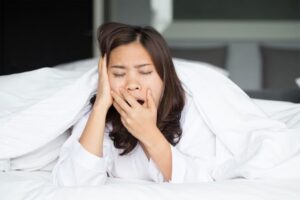There are many allergy medications designed for daytime and nighttime use. Typically the nighttime medication contains certain ingredients to help you fall asleep. Some— like Benadryl— make people sleepy no matter when they take it because of their histamine-blocking properties.
Many Americans also use Benadryl for sleep even when they aren’t experiencing allergies. However, Benadryl isn’t something you should use as a sleep aid— unless you’re experiencing nighttime allergies. When overused, Benadryl can potentially cause some undesirable side effects. But before we get into that, let me explain why so many people use Benadryl for sleep in the first place.
Why Does Benadryl Make You Sleepy?
While “daytime” pain relievers contain caffeine, nighttime formulas do not. Instead, they contain diphenhydramine so they can treat your pain while helping you sleep. That’s because the main side effect of this ingredient is drowsiness. Diphenhydramine is a histamine blocker used to treat allergy symptoms, some cold symptoms, and even motion sickness.
Many nighttime medicines like Tylenol PM, Advil PM, or Sudafed’s day/night cold medicine also contain the ingredient. In fact, according to the ingredient list for Benadryl Nighttime, the amount of diphenhydramine doubles from 25mg to a whopping 50mg!
Even though an antihistamine can make you drowsy, it isn’t made for treating insomnia. And if you already deal with hay fever, then you likely have an allergy medication like Benadryl in your home. So if you’re feeling exhausted and unable to sleep— especially from allergy season— it may be tempting to take Benadryl to help you sleep and relieve your symptoms.
This isn’t a good idea though, and here’s why.
Why You Should Not Use Benadryl for Sleep
Benadryl wasn’t created to help with insomnia. Not only that, but Benadryl can actually harm your sleep quality, even if it initially helps your sleep onset.
Taking Benadryl for sleep can also cause other adverse effects:
- Throwing off your sleep-wake cycle. While it can make you sneezy and sniffly, histamine also helps regulate your sleep-wake cycle. Histamine helps your body wake up— so by using medications that block it, you’re more likely to fall asleep. However, overuse can essentially confuse your sleep cycle and make it much harder for you to fall asleep at bedtime. The keyword here is “overuse—” if you only use Benadryl occasionally while experiencing allergy symptoms at night, you shouldn’t have any problems with your sleep-wake cycle.
- You may feel worse the next day. It’s common to experience daytime sleepiness or even a hangover of sorts after taking Benadryl at night. Of course, this can really put a damper on your day.
- Your sleep quality may be affected. While Benadryl can help you fall asleep faster and stay asleep longer, it won’t improve your sleep quality. Some of Benadryl’s potential side effects include dry mouth, an upset stomach, and headaches. These can be especially troublesome at night. Using antihistamines at night can potentially lead to parasomnias like sleepwalking as well. Remember, sleeping for a long time isn’t the same as getting good, restorative sleep. So even though you may be sleeping longer, it doesn’t mean that you’re sleeping better.
- Your body can quickly develop a tolerance for diphenhydramine in just a few days. This means you would need a higher dosage to get the same sleep-inducing effects. One study found that after four days of being used as a sleep aid, diphenhydramine worked no better than a placebo.
- It may cause problems with attention and focus— especially in the elderly. One study even found that medications like diphenhydramine may be linked to the development of dementia.
Long story short— you shouldn’t treat a sleep problem with allergy medication. Even prescription sleep aids can cause problems down the line, including insomnia, and should be discussed with your doctor.
There are other ways to get a good night’s sleep that don’t require medication.
Try These Remedies Instead
Whether you experience occasional sleeplessness or chronic insomnia, a good night’s sleep could be just a few simple changes away. Here are a few of my suggestions to help you get better sleep— all without Benadryl.
1. Try a Melatonin Supplement
Your body naturally produces melatonin to help you get the restful sleep you need each night. When you’re getting ready for bed, your body produces more to help you fall asleep and stay asleep. When you wake up, your body produces less to help you feel energized throughout the day.
If you’re struggling to get a good night’s sleep, if indicated, a melatonin supplement could give you the boost you need to sleep deeper and better.
2. Drink Tea
Some teas— including lavender, valerian root, and chamomile tea— can help you fall asleep faster and sleep better if you drink them before bedtime.
Avoid caffeinated tea like black tea or matcha though— these will definitely keep you awake! For good measure, avoid consuming any caffeine within six hours of your bedtime. That may seem like a long time, but that’s how long it takes for caffeine to fully leave your system!
3. Pay Attention to Your Sleep Hygiene
Sleep hygiene is basically all of your nighttime habits before bed. Good sleep hygiene helps you sleep better, while poor sleep hygiene can mean long nights wondering why you can’t sleep.
Here are a few ways you can improve your sleep hygiene tonight:
- Go to bed at the same time every night, and wake up at the same time every morning
- Stop using your electronic devices at least one hour before bed. The blue light emitted from these devices can impact your body’s natural melatonin production and make it harder to sleep.
- Give yourself an hour before bedtime to finish any unfinished tasks and to take care of your nightly ablutions like brushing your teeth and washing your face.
- Try relaxation techniques like journaling or meditation before bed. These can help you clear your mind, process the day’s events, and drift off to sleep stress-free.
4. Take a Shower or Warm Bath Before Bed
There’s nothing like a warm shower or bath to help you unwind after a long day. Taking a warm bath or shower an hour or two before bedtime can make it much easier to get a good night’s sleep. Both are an excellent way to relax your body, soothe sore muscles, and calm a racing mind. A warm bath or shower also lowers your body temperature, helping you cool down before settling into bed for the night.
If you have nighttime allergies, this can also wash off any irritants that could prevent you from sleeping well, such as pollen, dust, or pet dander.
Itching For A Good Night's Sleep? Skip the Antihistamine
There’s a reason why Benadryl is a popular and well-known allergy treatment— it works well if it’s used as recommended! And if you’re experiencing nighttime allergy symptoms, Benadryl can provide some welcome relief to those sleepless nights. However, it’s important to always use Benadryl as directed and avoid using it if you don’t have allergies.
Sleep issues are stressful, especially when it seems like the solution to your woes is as close as the grocery store. But instead of using an antihistamine like Benadryl for sleep, know that there are much better options out there.
Sometimes the smallest, simple changes can make the biggest difference. Give those a try and see how you feel!
References
Ask the Sleep Doctor
Have questions about sleep? Submit them here! We use your questions to help us decide topics for articles, videos, and newsletters. We try to answer as many questions as possible. You can also send us an email. Please note, we cannot provide specific medical advice, and always recommend you contact your doctor for any medical matters.




